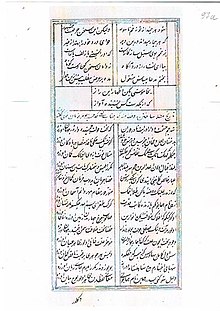Abdurrazzaq Nasha Tabrizi
Abdurrazzag Neshe Tabrizi | |
|---|---|
 A page from Nasha Tabrizi's dīvān | |
| Born | Azerbaijani:عبدالرزاق نشاء تبریزی 17th century Tabriz, Azerbaijan Province, Safavid Empire |
| Died | 1774-1775 Tabriz, Tabriz Khanate |
| Occupation | Poet |
| Language | Azerbaijani and Persian |
Abdurrazzag Nasha Tabrizi (Azerbaijani:عبدالرزاق نشاء تبریزی; b. Tabriz, Azerbaijan Province, Safavid Empire - d. 1774–1775, Tabriz, Tabriz Khanate) was a poet who wrote poems in Azerbaijani Turkish and Persian.
Life
[edit]Abdurrazzaq Nasha Tabrizi was born in the city of Tabriz at the end of the 17th century. He was descended from Jahan shah, one of the Qara Qoyunlu rulers. Like Jahan Shah, Nasha Tabrizi also wrote poems in Azerbaijani Turkish and Persian. In addition, Nasha Tabrizi, a soldier, participated in Nadir Shah Afshar's campaign in India.[1] He became famous for the ghazals he wrote during the reign of Nadir Shah. Influenced by Saib Tabrizi, he also wrote poems in "Indian style".[2] In 1741–1742, after Nadir Shah repaired the dome of Imam Ali's mausoleum, Nasha Tabrizi wrote a poem in Azerbaijani Turkish, and this poem was recorded on the main door of the mausoleum.[3][4][5][6]
A manuscript copy of Tabrizi's dīvān is kept in the Topkapı Palace Museum. This copy was written in 1763. Dīvān has 3 qasida and 6 ghazals in Azerbaijani Turkish.[2]
Although there are some opinions about the date of his death, according to Muhammad Ali Hosseini and Muhammad Amin Riyahi, Nasha Tabrizi died in Tabriz in 1775.[7]
References
[edit]- ^ Toghrul Nasirli, Alakhber Nakhiyev (2018-09-05). "Nəşə Təbrizinin divanının surəti əldə edilib". ANAS. Archived from the original on 21 October 2021. Retrieved 7 May 2024.
- ^ a b Kərimov 2020, p. 43.
- ^ Javad Heyat (1993). Azərbaycan ədəbiyyatına bir baxış. Bakı. p. 87.
{{cite book}}: CS1 maint: location missing publisher (link) - ^ Tourkhan Gandjeï (1977). "The turkish inscription of kalät-i nadiri". Wiener Zeitschrift für die Kunde des Morgenlandes. 69. Vyana: Department of Oriental Studies, University of Vienna: 45–53. JSTOR 23868094. Archived from the original on 2022-06-28. Retrieved 2022-06-28.
- ^ Rəhimova Aybəniz (2012). Qulam Məmmədli təzkirəsi. Bakı: Elm və təhsil. p. 434.
- ^ Gandjei 2023, p. 45-53.
- ^ Kərimov 2020, p. 44.
Soruces
[edit]- Paşa Kərimov (2020). XVIII əsr azərbaycan şairi Nəş'ə Təbrizi və onun türkdilli ədəbi irsi. Bakı.
{{cite book}}: CS1 maint: location missing publisher (link) - Paşa Kərimov (2023). Nəş'ə Təbrizi (PDF). Bakı.
{{cite book}}: CS1 maint: location missing publisher (link) - Tourkhan Gandjei (1977). The Turkish inscription of Kalat-i Nadiri. Wiener Zeitschrift für die Kunde des Morgenlandes, Vol. 69.
